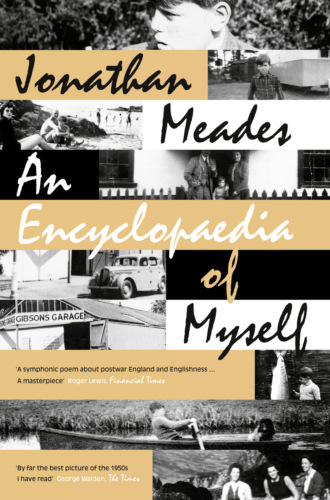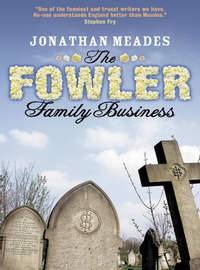
Полная версия
An Encyclopaedia of Myself
That these painful encounters took place in Bristol was particularly inappropriate, for this was a city that, more than any other, I associated with unmitigated pleasure. This was partly due to a friend of my mother’s charming lodger, Dick Lalonde. His route to the estate agents where he was doing his articles was the same as mine to school. He was a voluble propagandist for Bristol: he had been brought up there, had gone to Clifton College and returned when he qualified. Because I admired him I wanted to share his enthusiasm. That wasn’t difficult. The zoo, unlike London Zoo, didn’t reek of animals with hygiene deficiencies. There were deep-fried egg and chips at the Marine Café on the Triangle. Across the road, I ate my first ‘Chinese’ meal, and, in a barrel-vaulted cellar, my first pizza. At Daniel Neale on Park Street I bought a yellow and black dogtooth shirt and a French navy Windac windcheater. I gazed longingly at the chisel-toe slip-ons in a shop window on College Green. My father returned the old Morris Eight (reg JFM 897) which had been defeated by Hardknott to William Crawford and Son’s car fleet and collected a brand-new Morris Minor in which I took proprietorial pride. The words ‘floating harbour’ were enchanting.
Later I would bunk off school trips to the Old Vic – Dürrenmatt’s The Physicists was the most memorably dire play imaginable – and head with John Rosser and Jonathan Goddard to The Rummer, the very first Berni Inn, to drink ‘schooners’ of sherry. An exception was Harry H. Corbett’s Macbeth. His performance, immediately pre-Steptoe, was so dourly captivating that I did not accompany my friends to the bar. Three years later I saw Richard Pasco’s Hamlet (in gratuitous Napoleonic garb, which accorded with my childhood nightmare, but can have made little sense to anyone else). I had left school by then and had, I told myself, grown out of schooners.
And by then I had begun to appreciate the city’s manifold peculiarities. The jazz modern Smiths Crisps factory at Brislington; the literality of Totterdown’s name; the deep flights of outdoor steps; the sudden exhilarating glimpses of verdant hills outside the city; the sheer might of the tobacco warehouses; the streets of red sandstone Gothic villas; the terraced gardens of Clifton; the thrill of the gorge and the heartstopping suspension bridge and beyond them Leigh Woods where Mary N—’s body had been found.
ACCESS TO THE UNKNOWN
There was a class divide whose boundary was the two almost conjoined mediaeval bridges across the Avon at East Harnham. South of the river stood modest dwellings of many eras. Over the bridges at the northern end of St Nicholas Road the Liberty of the Cathedral Close culminates at De Vaux House on the corner of De Vaux Place. Liberty means, here, outside the Close but within the ecclesiastical jurisdiction of the Dean and Chapter whose stewardship of their sublime architectural charges was habitually as crass as their faith: Salisbury’s clergy were not afflicted by aesthetic probity or by doubt. These pious snobbish moralistic desiccated philistine bigots, unusually in their era, actually believed in their sanctioned mumbo-jumbo and its cruel rules.
Dr Harold Burt-White, the owner of De Vaux House, was probably not the sort of person they looked on with sympathy or wished to have live within the Liberty of the Close. He was a gynaecologist, an expert in puerperal infections and formerly senior house surgeon at Barts. Jim Laing’s atypically bar-room characterisation of another gynaecologist is perhaps appropriate: ‘He couldn’t think of anywhere better to play than where he worked.’ Burt-White was struck off the medical register in 1932 for having conducted an improper relationship with a patient and was cited as co-respondent in a messy divorce (is there any other sort?) which was also public. Dallas Burt-White, his sister, a mainstay of that decade’s society columns, accused the petitioner Harold Bevir of blackmailing her brother. She was duly sued for slander. Harold Burt-White countered by bringing a libel action against Bevir who had described him as a cad. And so it went on: appeals, rapprochements, paltry reputations worth fortunes. He was reinstated by the GMC after five years. A campaign had been waged by three hundred of his patients. He served in the RAMC in Ulster and took up a post at Salisbury Infirmary soon after the war. He was dark, sleek, saturnine, urbanely suited. He was said to drink heavily.
Outside De Vaux House, in the lee of a slightly raised pavement, stood his drophead Lagonda LG6, bulbously streamlined in the fashion of the late Thirties. It was liver-brown and fetish-black. I was mesmerised by it. The wheels were unperforated, solid-state and stately. There were spats over the rear ones. Such spats and wheels were unsporty, against nature, they spoke of worldliness, of arcane urban depravities. Until my mother or The German Girl tugged me away I followed my reflection in the bodywork’s millpool-deep enamel. That Lagonda was a sinister sleeping animal. And then it was gone. It was the car’s sudden absence, the very fact that it was no longer there, which would fix it for ever in my nervous system.
Mrs Bacon cleaned every morning at St Nicholas Hospital, the almshouses close by De Vaux House. Two afternoons a week she cleaned for my parents. I sat at the dining-room table toying with the tea she had made me, a glass of squash and a crumbling slice of bread glued with a slab of butter. She was in the kitchen with my mother, garrulously confidential, talking in a deafening whisper which meant that I wasn’t supposed to hear.
‘Suicide. Stst ohf … Old-fashioned cut-throat it were he used … That poor woman … Stst ohf I don’t know ’ow ’e could … Pool of blood, pool of blood …’ Her tuts were salacious and prurient. She was a News of the World reader, as moralistic, then, as the Dean and Chapter though more humane. ‘Stst ohf – that lovely ’ouse … Such a gentleman … Always raises ’is ’at. Stst ohf … Don’t ’old with suicide … And a doctor too …’
I heard the new word again. Suicide.
A pool of blood was as big as the garden pond at the bungalow in Britford Lane where Uncle Ken and Auntie Jessica lived. She had seen an adder swimming in it. Eavesdropping on Mrs Bacon I saw the water in the pond turn crimson.
It was autumn. Late the previous afternoon, Harold Burt-White had severed the radial artery of his left wrist and the anterior artery of his right leg. He could have had no better training in the procedures of suicide. His wife found him prone and unconscious on a tiled floor. To attempt suicide was still, in 1952, illegal in Britain. Rather than call the emergency services and risk his suffering prosecution should he survive, she contacted a colleague of his, an anaesthetist called Simpson. Not the obvious choice in the circumstances, but he lived nearby with his alarmingly flat-footed son. In defiance of his specialisation he succeeded in getting Burt-White to come round, only to be told: ‘Don’t bother. If I live I’ll kill myself.’ He didn’t live, he had already killed himself.
Lagonda. Lagonda is unfathomably complicit. It is not a necessarily rare sighting of a vehicle of that marque but the name, the very word, that triggers a swooning dream of release by the barber’s blade that was a physician’s, of the snake – evidently an adder – on the barber’s pole, of Roman death, of laurels, of the physician in a toga weighted with viscous blood, of noble disgrace and scorn for Christian obsequies. Where was he buried?
Once I discovered its defining property, which took some time, suicide became a secret within a secret. I kept my knowledge of it from the world. This was before the prepubertal investigation of sex and the dangerous vocabulary attached to it had to be cached deepest in my brain. Suicide was the most special death because it was chosen, as one might choose a Lagonda over an Allard. It was a peculiar luxury.
The propositions that the suicide may have no choice and that the act is one of necessity were inconceivable. Before we have heard of, witnessed or experienced irreparable despair, betrayal, persecution, boredom, depression, obloquy, self-disgust, guilt etc., suicide is a causeless, strangely glamorous occurrence apparently undertaken with free will (as we do not yet know to call it). Like all the manifold mysteries of infancy self-inflicted death is a magnet for the curious. Its contemplation is tonic. Puzzling about this way of death made me feel so alive despite the frustration of having to rely on scraps of information and not being able to ask any question more direct than ‘Where has the Lagonda gone?’
Конец ознакомительного фрагмента.
Текст предоставлен ООО «ЛитРес».
Прочитайте эту книгу целиком, купив полную легальную версию на ЛитРес.
Безопасно оплатить книгу можно банковской картой Visa, MasterCard, Maestro, со счета мобильного телефона, с платежного терминала, в салоне МТС или Связной, через PayPal, WebMoney, Яндекс.Деньги, QIWI Кошелек, бонусными картами или другим удобным Вам способом.



